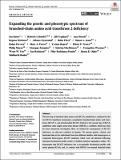Por favor, use este identificador para citar o enlazar a este item:
http://hdl.handle.net/10261/219551COMPARTIR / EXPORTAR:
 SHARE SHARE
 CORE
BASE CORE
BASE
|
|
| Visualizar otros formatos: MARC | Dublin Core | RDF | ORE | MODS | METS | DIDL | DATACITE | |

| Título: | Expanding the genetic and phenotypic spectrum of branched-chain amino acid transferase 2 deficiency |
Autor: | knerr, Ina; Colombo, Roberto; Urquhart, Jill; Morais, Ana; Merinero, Begoña CSIC; Oyarzábal, Alfonso CSIC ORCID; Pérez, Belén CSIC ORCID; Jones, Simon A.; Perveen, Rahat; Preece, Mary A.; Rogers, Yvonne ; Treacy, Eileen P.; Mayne, Philip; Zampino, Giuseppe; MacKinnon, Sabrina; Wassmer, Evangeline; Yue, Wyatt W.; Robinson, Ian; Rodríguez-Pombo, Pilar CSIC ORCID; Olpin, Simon E.; Banka, Siddharth | Palabras clave: | Autism spectrum disorder BCAT2 Branched-chain amino acids Branched-chain amino transferase 2 Encephalopathy maple syrup urine disease. |
Fecha de publicación: | 2019 | Editor: | Kluwer Academic Publishers | Citación: | Journal of Inherited Metabolic Disease (2019) | Resumen: | The first step in branched-chain amino acid (BCAA) catabolism is catalyzed by the two BCAA transferase isoenzymes, cytoplasmic branched-chain amino acid transferase (BCAT) 1, and mitochondrial BCAT2. Defects in the second step of BCAA catabolism cause maple syrup urine disease (MSUD), a condition which has been far more extensively investigated. Here, we studied the consequences of BCAT2 deficiency, an ultra-rare condition in humans. We present genetic, clinical, and functional data in five individuals from four different families with homozygous or compound heterozygous BCAT2 mutations which were all detected following abnormal biochemical profile results or familial mutation segregation studies. We demonstrate that BCAT2 deficiency has a recognizable biochemical profile with raised plasma BCAAs and, in contrast with MSUD, low-normal branched-chain keto acids (BCKAs) with undetectable l-allo-isoleucine. Interestingly, unlike in MSUD, none of the individuals with BCAT2 deficiency developed acute encephalopathy even with exceptionally high BCAA levels. We observed wide-ranging clinical phenotypes in individuals with BCAT2 deficiency. While one adult was apparently asymptomatic, three individuals had presented with developmental delay and autistic features. We show that the biochemical characteristics of BCAT2 deficiency may be amenable to protein-restricted diet and that early treatment may improve outcome in affected individuals. BCAT2 deficiency is an inborn error of BCAA catabolism. At present, it is unclear whether developmental delay and autism are parts of the variable phenotypic spectrum of this condition or coincidental. Further studies will be required to explore this. | Versión del editor: | http://dx.doi.org/10.1002/jimd.12135 | URI: | http://hdl.handle.net/10261/219551 | DOI: | 10.1002/jimd.12135 | Identificadores: | doi: 10.1002/jimd.12135 issn: 1573-2665 |
| Aparece en las colecciones: | (CBM) Artículos |
Ficheros en este ítem:
| Fichero | Descripción | Tamaño | Formato | |
|---|---|---|---|---|
| PérezB_ExpandingTheGenetic.pdf | 2,63 MB | Adobe PDF |  Visualizar/Abrir |
CORE Recommender
SCOPUSTM
Citations
18
checked on 21-abr-2024
WEB OF SCIENCETM
Citations
13
checked on 29-feb-2024
Page view(s)
230
checked on 27-abr-2024
Download(s)
576
checked on 27-abr-2024
Google ScholarTM
Check
Altmetric
Altmetric
NOTA: Los ítems de Digital.CSIC están protegidos por copyright, con todos los derechos reservados, a menos que se indique lo contrario.
